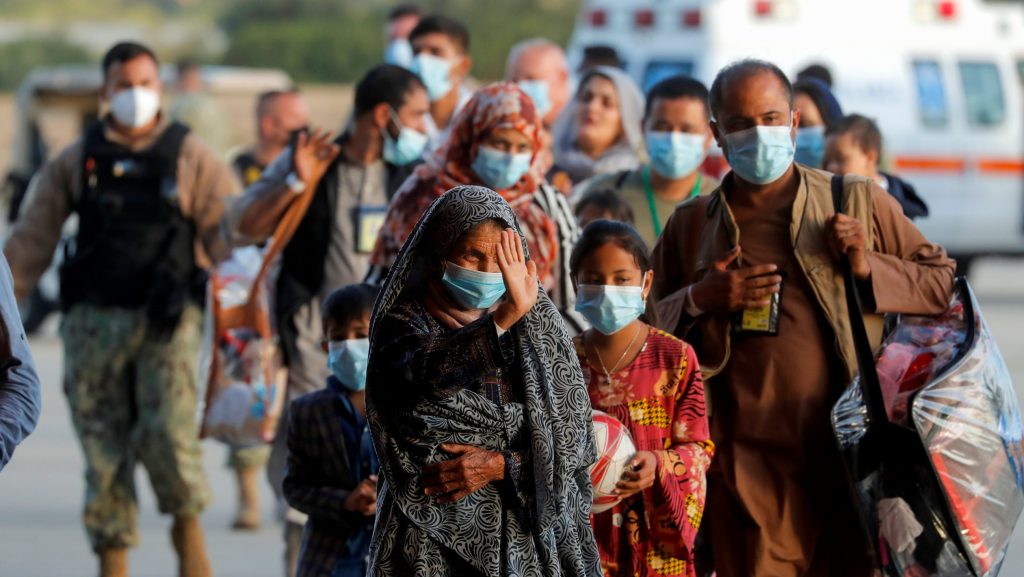With potentially thousands still stuck in Afghanistan hoping to be evacuated after most western troops have withdrawn, Catholic aid agencies are stepping in with the hope of expanding access to safe passage for those who still wish to get out.
The Coordinator of Humanitarian Corridors in Greece for the Community of Sant’Egidio, Monica Attias, has been assisting with evacuation of Afghan refugees since the Taliban’s takeover of Kabul in mid-August.
She told Crux most of the families she’s spoken with “were surprised that Kabul was [taken] so soon.”
The military, she said, was “unprepared for this,” and because of this, evacuations did not begin as early as they could have.
“Either on the Italian side or the Afghan side, there was not that immediate sense of danger, so when some of them started to move too late – those who started to move on the 18th were able to reach Italy,” however, those who arrived later got there “too late, when it was impossible to reach the gate.”
“This is something that strikes me very much,” Attias said, adding, “We certainly could have saved more people.”
Now, Attias and the Sant’Egidio Community are working to expand the humanitarian corridors program they have in place with the government of Italy, and which has already been used to bring some 300 refugees stranded in Greece to Italy.
According to Attias, the bulk of refugees and asylum seekers stranded in Lesbos, around 45 percent, are from Afghanistan, including many from the Hazara ethnic group.
As of 2021, Afghanistan is one of five countries Greece has ruled is ineligible for asylum, meaning that the swaths of Afghans camping out on Greece’s shores are either stuck, or face deportation to Turkey.
However, the current crisis in Afghanistan could change deportation orders, Attias said, but “we don’t know what will happen.”
“They are stuck in the camps without any statutes, so they just receive food, but they have no other rights, they are just in a limbo, we don’t know for what,” she said. “Some of them try to find their way legally because it’s now 2-3 years that there are there without any practical resolution to this situation.”
Since 2016, Sant’Egidio has been working with the Italian Ministry of Foreign Affairs and the Defense Ministry to provide a humanitarian corridor for safe passage to Italy for select refugees waiting in Lesbos camps.
In total, they have brought over 300 people just since last year and are expecting to bring an additional 200 people from Greece to Italy over the next six months.
Attias said it was already their intention is to expand these humanitarian corridors to allow more migrants and refugees to get out of limbo, but this has become more urgent in the wake of the most recent Afghan crisis.
“I’m really not able to say when because there is nothing official yet” in terms of when these expansions might happen, she said, but the intention is to transport people from countries neighboring Afghanistan such as Iran and Pakistan.
Sant’Egidio itself has assisted in the evacuation of 108 people from Kabul who were identified as being at “high-risk” in the Taliban takeover. These people are currently in quarantine in Italy, and afterward will be hosted or supported by families, communities, or churches with ties to Sant’Egidio.
Attias voiced relief that no one they are associated with was impacted by the suicide bombing at the Kabul airport last week.
For those who made it to Italy with Sant’Edigio’s help, they are welcomed by group from the community at the airport, who brought with them trinkets for children, much-needed toiletries, and a change of clothes, “because these people have suffered a lot waiting in the mud in front of the airport without eating, without washing themselves, without drinking, so when they arrived, they were totally wrecked.”
“There was an immediate need of things to restore them, to make them feel good before they went to the quarantine,” Attias said, noting that there are still some 300 people they would like to evacuate.
“Every minute we receive an email of Afghans who live in Italy who have relatives who are trying to escape,” she said, noting that they have many lists of human rights activists, journalists, and other people they’ve met through their work that want to get out.
The number of people who reach out for assistance “is growing every day because the humanitarian corridors are well-known and so there are many who look at Sant’Edigio as a means of promoting this kind of initiative, but there are many, many more,” she said, saying they are also in touch with several other NGOs who are leading similar initiatives, and even with them, the number of requests for evacuation “are very, very high.”
Yet while evacuating people from countries near Afghanistan is an urgent need to be addressed, these corridors must also continue in Greece, Attias said, “because the people who are stuck in Greece have no future.”
“European countries should really re-open a program of relocation that has now been terminated because there is no alternative solution,” she said, adding, “maybe Canada and the United States can also do their part.”

